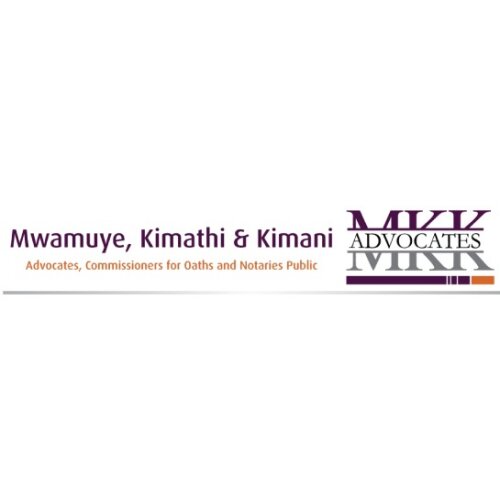Best Climate Change Law Lawyers in Kisumu
Share your needs with us, get contacted by law firms.
Free. Takes 2 min.
List of the best lawyers in Kisumu, Kenya
About Climate Change Law in Kisumu, Kenya
Climate Change Law in Kisumu, Kenya refers to legal frameworks, policies, and regulations aimed at addressing the impacts of climate change on the local environment, economy, and community. Located on the shores of Lake Victoria, Kisumu is affected by climate change issues such as flooding, changing rainfall patterns, food insecurity, and loss of biodiversity. Local and national legal frameworks have been developed to promote climate resilience, safeguard natural resources, and align with international commitments like the Paris Agreement and the United Nations Sustainable Development Goals. The law covers areas such as environmental protection, sustainable development, land use, waste management, adaptation strategies, and the rights of affected communities.
Why You May Need a Lawyer
There are several situations where individuals, businesses, or communities in Kisumu may need legal support concerning Climate Change Law:
- Navigating complex environmental regulations for commercial development or agricultural projects.
- Addressing disputes over land and water resources due to climate change impacts.
- Seeking compensation for environmental damage or loss caused by climate-related events such as flooding and droughts.
- Ensuring compliance with local and national climate change legislation by businesses and organizations.
- Protecting the rights of vulnerable groups affected by projects or actions that exacerbate climate risks.
- Participating in public consultations on climate policy and advocating for stronger climate action.
- Interpreting the roles and responsibilities between county and national governments regarding climate initiatives.
Local Laws Overview
Kisumu County operates within Kenya's national legal framework on climate change, but also has county-specific regulations and policies. The key aspects include:
- The Climate Change Act, 2016 - Kenya's main law on climate change, which sets the framework for mitigation, adaptation, and reporting. It requires both national and county governments to take action.
- Kisumu County has its Climate Change Fund Legislation to support local adaptation and mitigation projects.
- Environmental Impact Assessment (EIA) regulations enforced by the National Environment Management Authority (NEMA) require most projects to assess and minimize climate-related impacts.
- Land use and zoning by-laws consider climate risks such as floods and erosion, especially near Lake Victoria.
- Water resource management is guided by both the Water Act, 2016 and relevant county rules, especially for irrigation, waste control, and catchment protection.
- The Forestry Act and local initiatives regulate tree cover and conservation in Kisumu.
- Public participation is a legal right in environmental governance processes.
Frequently Asked Questions
What is the purpose of Climate Change Law in Kisumu?
The main aim is to guide actions that protect the environment, reduce greenhouse gas emissions, enhance community resilience, and ensure sustainable development in the face of a changing climate.
Who enforces Climate Change Law in Kisumu?
The National Environment Management Authority (NEMA) and Kisumu County Government are key enforcers. Other stakeholders include the Water Resources Authority and community-based organizations.
Must all development projects in Kisumu undergo Environmental Impact Assessments?
Most projects that may significantly affect the environment must undergo an Environmental Impact Assessment. The results help determine if the project can proceed and under what conditions.
What legal rights do communities have in regard to climate change policies?
Communities have the right to participate in policy-making, be consulted on projects affecting their environment, and claim compensation for loss or damage due to climate change or mismanaged development.
Are businesses in Kisumu required to follow climate change regulations?
Yes. Businesses must comply with environmental standards, conduct regular audits, and take measures to reduce their carbon footprint as per local and national laws.
How can affected persons claim compensation for climate-related damage?
Victims can seek compensation through courts or statutory bodies like NEMA for cases related to pollution, hazardous activities, or loss caused by non-compliance with Climate Change Law.
Is there a specific law for wetlands and water bodies like Lake Victoria?
Wetlands and water bodies are protected under both the Environmental Management and Coordination Act and various Kisumu County by-laws focusing on conservation and sustainable use.
How does Climate Change Law affect land use in Kisumu?
Laws require that land use plans consider climate risks such as floods and drought. Certain areas may be restricted for development or require additional mitigation measures.
What penalties exist for violating Climate Change Law?
Penalties range from fines and closure of business to restoration orders and, in severe cases, imprisonment for illegal or negligent activities causing environmental harm.
Can individuals influence climate policy in Kisumu?
Yes. Public participation is required by law. Individuals or groups can attend public hearings, submit comments, and join advocacy campaigns to shape climate action in the county.
Additional Resources
There are several government and community resources available for those seeking legal advice in Climate Change Law in Kisumu:
- Kisumu County Government Environment Department - Handles policy, permitting, and community engagement on climate.
- National Environment Management Authority (NEMA) Kisumu Office - Oversees EIAs, enforcement, and complaints.
- Kenya Climate Change Working Group - Provides research, advocacy, and connections to legal experts.
- Law Society of Kenya - Offers a directory of lawyers experienced in environmental and climate change law.
- Local NGOs and community-based organizations - Such as Umande Trust, which focuses on climate resilience and rights in Kisumu.
Next Steps
If you believe you require legal assistance or are affected by climate change issues in Kisumu, consider the following steps:
- Identify your specific issue, such as project approval, compensation, or compliance matters.
- Collect all relevant documents, permits, or correspondence related to your issue.
- Contact the Kisumu County environmental office or NEMA for initial guidance and clarification on regulations.
- Consult a lawyer specializing in environmental or climate change law through the Law Society of Kenya or local legal aid centers.
- Engage with local advocacy groups or NGOs for support, education, and assistance in understanding your legal rights.
- Participate in public meetings and discussions related to climate policy if your concern involves public projects or county regulations.
- If necessary, pursue legal action through formal complaint processes or the courts to protect your rights or seek remedy under the law.
Early engagement with qualified professionals and authorities will help ensure your interests are protected and your actions are compliant with current Climate Change Law in Kisumu County.
Lawzana helps you find the best lawyers and law firms in Kisumu through a curated and pre-screened list of qualified legal professionals. Our platform offers rankings and detailed profiles of attorneys and law firms, allowing you to compare based on practice areas, including Climate Change Law, experience, and client feedback.
Each profile includes a description of the firm's areas of practice, client reviews, team members and partners, year of establishment, spoken languages, office locations, contact information, social media presence, and any published articles or resources. Most firms on our platform speak English and are experienced in both local and international legal matters.
Get a quote from top-rated law firms in Kisumu, Kenya — quickly, securely, and without unnecessary hassle.
Disclaimer:
The information provided on this page is for general informational purposes only and does not constitute legal advice. While we strive to ensure the accuracy and relevance of the content, legal information may change over time, and interpretations of the law can vary. You should always consult with a qualified legal professional for advice specific to your situation.
We disclaim all liability for actions taken or not taken based on the content of this page. If you believe any information is incorrect or outdated, please contact us, and we will review and update it where appropriate.









